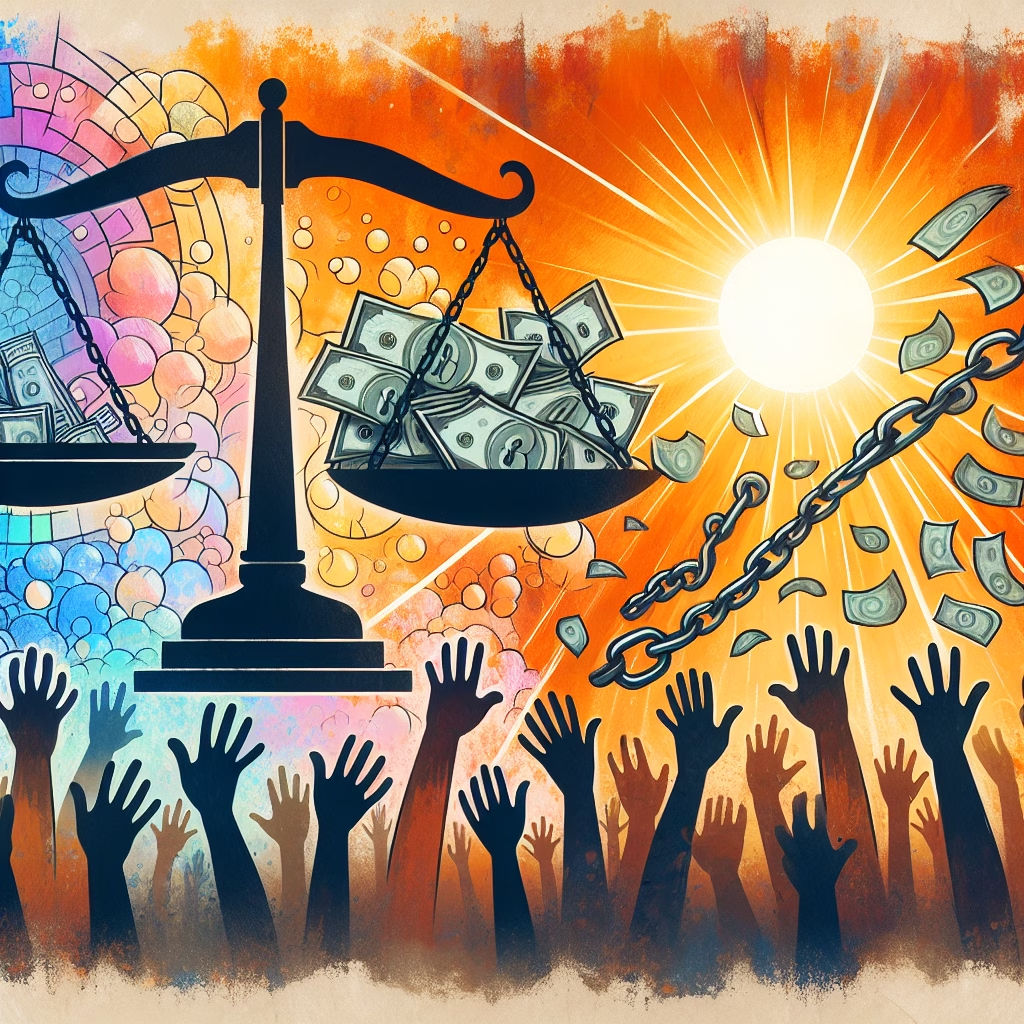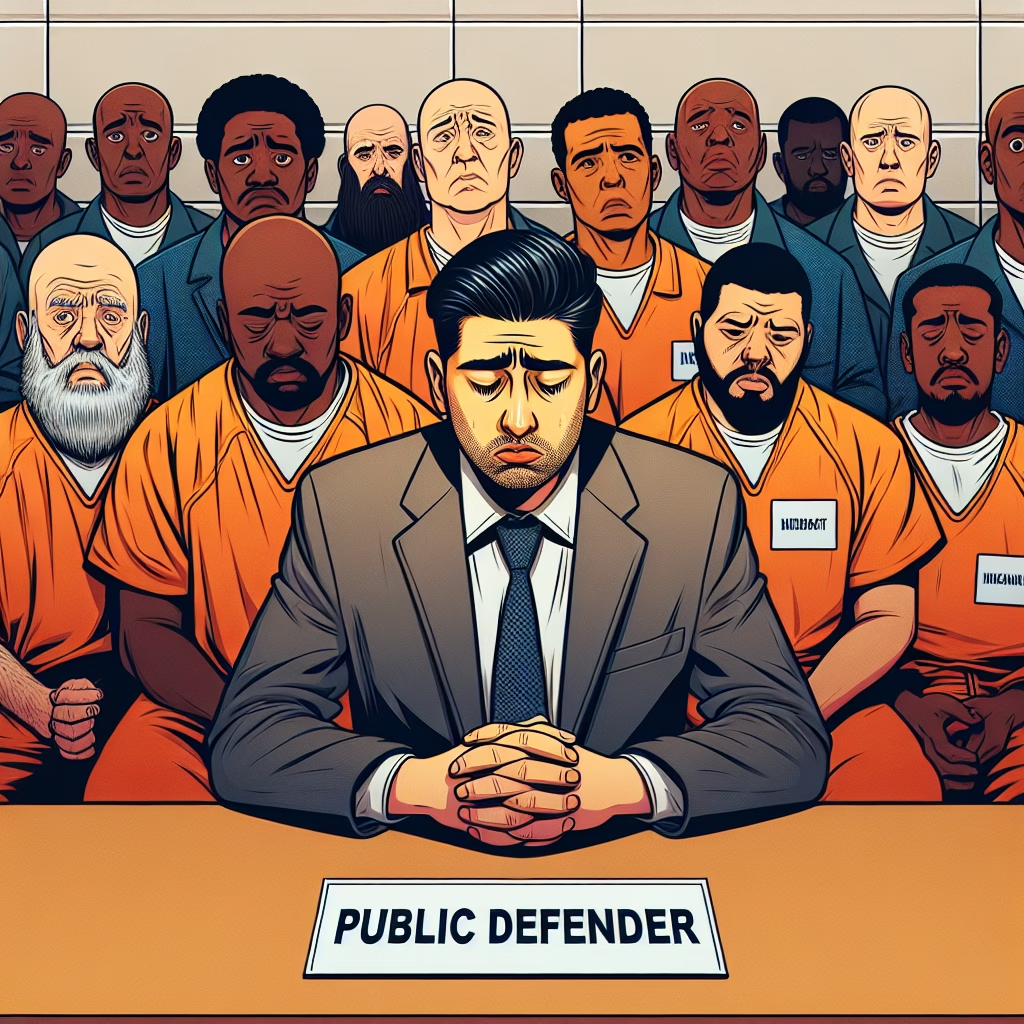The crisis of pretrial detention in the United States highlights a profound constitutional dilemma. Systemic inequities often overshadow the rights of the indigent. This issue is starkly illustrated by the case of a Georgia man. He has languished in jail without bond and is forced to navigate the legal system alone. This happened after his public defender abandoned him. His plight underscores a broader pattern of judicial neglect and underfunded public defense, which disproportionately impacts low-income and minority defendants.
Despite landmark rulings like Payne v. Superior Court affirming the constitutional rights of incarcerated individuals, the intersection of wealth and justice remains fraught with disparities. As we delve into the pressing need for bail system reform, we explore pathways to ensure indigent defense rights. It becomes clear that achieving criminal justice equity is both a moral and legal imperative.
Constitutional Crisis in Pretrial Detention
The current state of pretrial detention in the United States reveals a deep-rooted constitutional crisis. The fundamental rights of the accused are often compromised due to systemic failures. This section examines the key issues contributing to this crisis and its impact on indigent defendants.

Case Study: Georgia Man's Plight
The case of a Georgia man languishing in jail without bond for nearly two years starkly illustrates a constitutional crisis. The situation highlights a significant issue in pretrial detention. Abandoned by his public defender, he was forced to file pro se motions that remain unaddressed.
This situation highlights the breakdown of the justice system. An individual's right to a speedy trial is effectively nullified. Their right to adequate representation is also nullified. The man's experience is not unique but rather a symptom of a larger problem plaguing the American legal system.
His case serves as a poignant reminder of how the system can fail those it's meant to protect, especially when defendants lack the financial means to secure private counsel.
The Impact of Judicial Indifference
Judicial indifference plays a significant role in perpetuating the crisis of pretrial detention. When judges fail to prioritize the constitutional rights of defendants, especially those who are indigent, it leads to a cascade of negative consequences.
This indifference manifests in various ways:
- Excessive delays in hearing motions
- Failure to appoint counsel promptly
- Reluctance to consider alternatives to detention
The result is a system where poverty essentially acts as a life sentence. It traps individuals in a cycle of incarceration and legal limbo.
The National Association of Criminal Defense Lawyers has highlighted how this judicial unconcern contributes to overcrowded jails and the deterioration of due process rights.
Systemic Underfunding of Public Defense
The chronic underfunding of public defense systems across the United States exacerbates the constitutional crisis in pretrial detention. This systemic issue leads to:
- Overwhelming caseloads for public defenders
- Inadequate resources for proper case preparation
- Limited ability to challenge unjust detentions
As a result, many indigent defendants receive subpar legal representation, if any at all. This underfunding directly contradicts the promise of Gideon v. Wainwright, which established the right to counsel for those who cannot afford it.
The American Bar Association has consistently advocated for increased funding and resources for public defense to address this critical issue.
Wealth-Based Detention Consequences
The consequences of wealth-based detention extend far beyond the courtroom, creating a ripple effect that impacts individuals, families, and entire communities. This section explores the devastating effects of a system that often equates justice with financial means.
The Deadly Reality of Cash Bail
The cash bail system has proven to be not just unjust but potentially deadly for those unable to pay. This reality is starkly illustrated by high-profile cases that have garnered national attention.
Sandra Bland's tragic death in a Texas jail cell underscores the extreme consequences of wealth-based detention. Sandra was unable to post a $500 bail for a minor traffic violation. Similarly, Kalief Browder's three-year detention at Rikers Island over an unproven theft allegation, followed by his suicide after release, highlights the long-lasting trauma inflicted by pretrial incarceration.
These cases are not isolated incidents but rather symptoms of a systemic problem where poverty can effectively become a death sentence.

Racial Disparities in Bail Amounts
The issue of racial disparities in bail amounts further compounds the injustice of wealth-based detention. Studies have consistently shown that Black defendants face significantly higher bail amounts than their white counterparts for similar charges.
Key statistics reveal:
- Black defendants face bail amounts $9,923 higher on average than white peers for similar charges
- This disparity persists even when controlling for the severity of the alleged offense and prior criminal history
These racial inequities in bail setting contribute to the overrepresentation of people of color in pretrial detention. This perpetuates a cycle of injustice. It amplifies systemic racism within the criminal justice system.
Pretrial Punishment and Its Impacts
Pretrial detention, often justified as a preventive measure, frequently becomes a form of punishment before conviction. This "pretrial punishment" has far-reaching consequences for detainees and their communities.
Impacts include:
- Job loss and economic instability
- Housing insecurity or homelessness
- Disruption of family relationships and childcare arrangements
- Mental health deterioration due to the stress of incarceration
Moreover, studies show that pretrial detention increases the likelihood of conviction. It also leads to longer sentences. This creates a compounding effect of injustice for those unable to secure release.
The Brennan Center for Justice has extensively documented these impacts. Their work highlights the urgent need for bail system reform. This reform is necessary to address these systemic inequities.
Pathways to Reform and Advocacy
Addressing the constitutional crisis in pretrial detention requires a multifaceted approach, combining legal challenges, legislative efforts, community initiatives, and systemic reforms. This section explores various pathways to reform and advocacy efforts aimed at creating a more just and equitable system.
Legal Challenges and Legislative Efforts
Legal challenges and legislative efforts form the backbone of systemic reform in pretrial detention practices. These initiatives aim to address the constitutional issues inherent in wealth-based detention and promote more equitable alternatives.
Key efforts include:
- ACLU's Smart Justice Campaign, which challenges wealth-based detention through strategic litigation like Daves v. Dallas County
- Legislative pushes such as California's SB 10, which aimed to eliminate cash bail
- Advocacy for risk assessment reforms to address racial bias in pretrial decision-making
These efforts collectively work towards dismantling the current system's reliance on financial means as a determinant of pretrial freedom.
The Role of Community Bail Funds
Community bail funds have emerged as a powerful grassroots response to the injustices of wealth-based detention. These organizations play a crucial role in mitigating the immediate harms of the cash bail system while advocating for long-term reforms.
Since 2016, the National Bail Fund Network and its member organizations have secured the release of over 40,000 individuals. This direct action not only provides immediate relief to detainees and their families but also demonstrates the viability of alternatives to cash bail.
Community bail funds also serve as important data collection points, providing valuable insights into the impacts of pretrial detention and the efficacy of release programs.

Investing in Holistic Defense Models
Holistic defense models represent a comprehensive approach to addressing the needs of indigent defendants, going beyond traditional legal representation to address the root causes of involvement with the criminal justice system.
Key components of holistic defense include:
- Integrated teams of attorneys, social workers, and advocates
- Comprehensive needs assessments addressing legal and non-legal issues
- Continued support post-case resolution to prevent recidivism
New York's $250 million investment in public defense, which reduced caseloads by 32%, demonstrates the potential impact of adequately funded, holistic approaches to indigent defense.
Gideon's Promise, a non-profit organization, has been at the forefront of promoting and implementing holistic defense models across the United States.
Conclusion: A Call to Action for Justice Reform
The constitutional crisis in pretrial detention underscores the urgent need for comprehensive reform within the American criminal justice system. Indigent defendants face profound injustices that are not just isolated incidents. These injustices are symptomatic of a deeply flawed system. Poverty and racial disparities perpetuate cycles of disadvantage. As evidenced by the tragic stories of individuals like Sandra Bland and Kalief Browder, the current state of pretrial detention has life-altering and, at times, life-ending consequences.
To remedy this, it is imperative to pursue a dual strategy that addresses both immediate relief and systemic change. Legal challenges and legislative efforts must be vigorously pursued to dismantle the entrenched biases of bail practices. Concurrently, grassroots initiatives, such as community bail funds and holistic defense models, offer crucial support mechanisms that alleviate the injustices faced by those most vulnerable.
Ultimately, achieving equity in the criminal justice system is not only a legal obligation but a moral imperative. A collective commitment is required from policymakers, legal professionals, and communities. Together, they must uphold the foundational principles of fairness and justice enshrined in our Constitution. As we move forward, let us resolve to create a system that truly serves all its members. Justice should not be a privilege of the wealthy. It must be a right afforded to every individual, regardless of their socio-economic status.
Supplemental Resources
Advocacy Organizations:
- Gideon’s Promise (Training for public defenders)
- National Legal Aid & Defender Association (Systemic reform tools)
- Georgia Public Defender Council (State-level support)
- National Bail Fund Network (Bail assistance)
Downloadable Legal Templates:
Bail Reduction Request Template